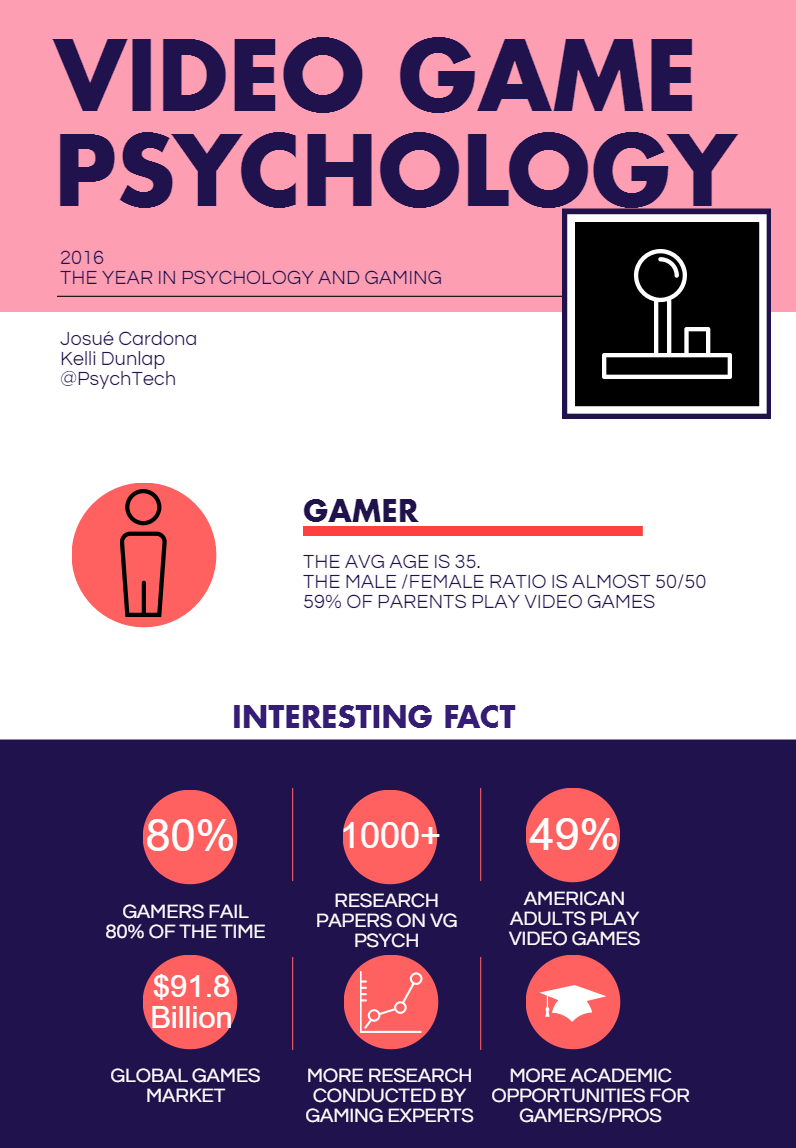The hosts of PsychTech, Josué Cardona and PsyD Kelli Dunlap, held an amazing panel to discuss this year’s achievements in the hybrid industry of video games and psychology. To get an understanding of the magnitude of significant developments in video game psychology, let’s look at some amazing stats reported this year.
Dr. Philip Zimbardo’s New Book The Demise of Guys
This year, Dr. Philip Zimbardo published a book titled The Demise of Guys: Why Boys Are Struggling and What We Can Do About It. In the book, Zimbardo asks the question, “Is the rampant overuse of video games and online porn causing the demise of guys?” The book sparked debates on whether the topic was overplaying a thesis with less data driven facts and more convincing hypothesis or cited anecdotal evidence. Panelist Cardona and Dunlap criticize the book as failing to asses the connection from an unbiased perspective. It also goes without saying that though Dr Zimbardo is well known in his research studies, his viewpoint of video games has always been publicly negative. His book states that boys failing academically and their rejection of women is due to games. Whether that is true or not is up to speculation.
Riot Games Player Behavior Initiative
In the past year, Riot Games has devoted a tremendous amount of resources to player behavior. One particular experiment brought up by our panelist is a survey given by Riot Games to previously banned players who deliberately made prohibited and crude summoner names. The survey was to analyze why players purposefully created summoner names that go against the guidelines established. The survey, if completed honestly, would allow summoners the opportunity to change their summoner name and unlock it without being charged a fee. Though, according to Dunlap, the survey was not properly configured to avoid the ethical violations, it still nonetheless brought to light the mindset of players’ intentional trolling.
Anti-Social Behavior from Game Design?
Riot Games has become a staple at GDC talks and has sparked the conversation on understanding how game design evokes player behavior. One particular speaker, PhD player researcher Ben Lewis-Evans, discussed how game design can help anti-social behavior. [Video] Panelist Dunlap articulates that because the topic of how players behave is being researched, we are beginning to see a shift in responsibility attributed to game designers. Researchers are understanding that game designers can evoke certain positive and negative behaviors which can help or hurt the community as a whole.
Academics are battling the idea that anti-social behavior in games is a problem. Since behavior is motivated by interactions within a complex system, game systems sometimes reward negative behaviors. Game designers have the power to reduce anti-social behaviors in games. Though it is also important to mention that sometimes designers will evoke negative behaviors even if the game is not designed to. A major takeaway is interactions within game have a reliable predictor of someone leaving a game or acting negatively if a player’s interaction with other players was toxic.
Gamer Personality Traits Correlates to Player Motivation
During GDC 2016, co-founder of Quantic Foundry Nick Yee showcased models and findings of game motivation profiles. Yee believes gamers are not monolithic groups which means their tastes are not all the same. With varying motivations, Yee’s team conducted a data survey of over 140,000 gamers world wide. The data revealed significance between gamer personality and game genre preference/behavior in addition to how they relate to each other in gender, age, and personality traits.
Games are an identity management tool. Games help us become more of who we really are.
Nick Yee
Can Video Games Really Become An Addiction?
During the QA section of the panel, one attendee questioned if video games truly can be an addiction. Kelli Dunlap perfectly articulated that an addiction is typically chemical, meaning that a substance enters the body causing a chemical reaction to become hooked on said substance. With gaming, it is more an impulsive behavior where a person acts without thinking about the consequences of their actions. Impulsivity is linked to poor self control and severe urges that can be either serious or pervasive. By using healthy coping mechanisms such as mindfulness, we can encourage players to reflect on their options and empower them to make more rational decisions on how to respond to events around them.
Playing Violent Games Uses More Brain Power
Finally, panelist discussed the amazing findings of Daphne Bavelier, a brain scientist who looked into what our brains look like when playing action video games. The findings showed that players who played action video games have a higher mental awareness capacity than non-action playing gamers. Using brain imaging, we can view the impacts of games on our brain to find changes to main networks that change brain attention in the frontal lobe, parietal lobe, and anterior cingulate.
Video game psychology is changing the way we see and use games. To many, games now represent more than a means of entertainment. What one can take away from Josué Cardona and PsyD Kelli Dunlap is that we are living in a revolutionary era of video games that foretells a great awakening for gamers and non-gamers alike.








Published: Apr 25, 2016 07:39 am